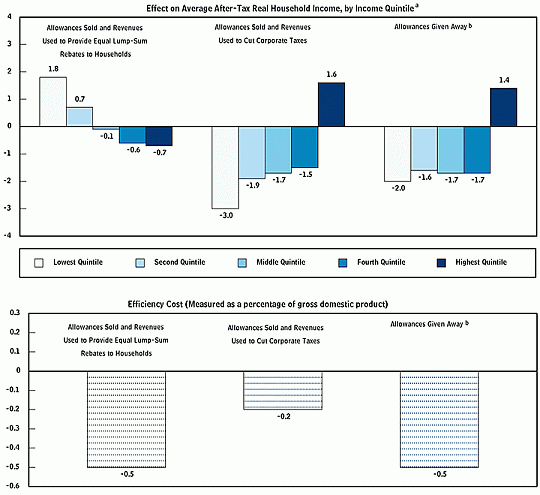carbon pricing
-
Myth: Europe’s experience shows that cap-and-trade can’t work
It is now widely acknowledged that Europe’s carbon trading program — the ETS — made several key mistakes in its initial trial period. The system covered a narrow slice of the EU economy, yielding a relatively small market wherein price fluctuations could not be effectively smoothed out. The data on baseline emissions was poor and […]
-
The choice of what to do with carbon revenue is a clear-cut issue of justice
The debate around various climate policies sounds complex, but there’s a simple way to understand it: follow the money. When we put a price on carbon emissions, we place value on something that used to be worthless. That means all the sudden there’s a big new pot of money. The most important question facing policymakers […]
-
One last foray into the economics discussion
The guys at Environmental Economics replied to my post on economics and climate here and here. Read if you like. I would protest that "the extreme position by some environmentalists that economics is evil" has nothing to do with me or what I wrote, and that if there is some war between Environmentalism As Such and Economics As Such I want nothing to do with it, but ... feh.
I just want to make one final point, somewhat abstracted from the details of this oh-so-illuminating back and forth. In the course of decrying the pointlessness of a battle between greens and economists, Ryan Avent defends me from Tim Haab's charge that I'm an idiot:
Roberts is very smart on these issues and has a very sophisticated, and for the most part correct (in my view), outlook on carbon pricing.
First, thanks!
Now, not to look a gift horse in the mouth, but note the evidence offered that I'm not an economic philistine: I respect carbon pricing. I don't want to make too much of a passing comment, but this strikes me as endemic to these debates: the notion that when it comes to environment and energy issues, "economics" means "market-based policy" means "pricing."
This seems like a weirdly constrained use of economics to me -- reflective of the narrow range of economics visible in America's public conversation -- and it's made for a weirdly constrained debate. Economists themselves aren't necessarily guilty -- see here -- but it's true of many people arriving newly to climate/energy policy debates. They discover that Economic Science says one thing and fuzzy headed advocates say something else, so of course they want to be Sensible and side with Economic Science (don't want to get patouli on you!). Thus you get a weird kind of zealotry around pricing from people who know very little about the specifics of environmental history or regulation or technology, whereby they wildly overstate the potential of pricing and proclaim confidently that Economic Science has discredited the alternatives. (*cough*carbon tax advocates*cough)
Seems to me, though, economic thinking could go both more micro and more macro than carbon pricing.
-
Van Hollen to introduce cap-and-dividend bill
Fans of carbon-pricing schemes that would return the vast majority of tax or carbon auction revenue to consumers think there’s increasing political momentum for their proposals in Congress these days. Proponents of cap-and-dividend — a carbon-pricing plan that would auction off pollution credits to industries and send roughly 90 percent of the resulting revenue to […]
-
More evidence that burden sharing is the same up and down stream
We can auction carbon permits or levy carbon fees/taxes upstream (at the mine mouth or well head, or on import or refining) or downstream, where fuel is actually burned. The main argument for levying downstream is that it will distribute the burden of who pays differently than levying upstream, because the fossil fuel industry won't be able to pass all of the fee or tax along. Most other arguments for downstream emissions pricing depend on that as a premise.
In my last post I pointed out that a gasoline tax, which is levied about as far upstream as possible, still ends up with about half the cost pushed back (PDF) to the producers. Since that thread has grown very long, I want to point out that general economic theory holds that where a consumption tax is levied generally does not affect tax incidence. To translate that from economic jargon: even if the store writes the check to the government, the customer still pays a lot of the cost. If the customer had to write the check to the government, the store would have to lower prices to make up for some (but not all) of the payment by the customer.

